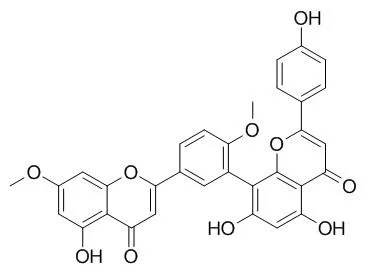| Kinase Assay: |
| Cancer Sci. 2015 Apr;106(4):413-20. | | Ginkgetin inhibits the growth of DU-145 prostate cancer cells through inhibition of signal transducer and activator of transcription 3 activity.[Pubmed: 25611086] | Signal transducer and activator of transcription 3 (STAT3) is constitutively activated in human cancers. Therefore, STAT3 is a therapeutic target of cancer drug discovery. We previously reported that natural products inhibited constitutively activated STAT3 in human prostate tumor cells.
METHODS AND RESULTS:
We used a dual-luciferase assay to screen 200 natural products isolated from herbal medicines and we identified Ginkgetin obtained from the leaves of Ginkgo biloba L. as a STAT3 inhibitor. Ginkgetin inhibited both inducible and constitutively activated STAT3 and blocked the nuclear translocation of p-STAT3 in DU-145 prostate cancer cells. Furthermore, Ginkgetin selectively inhibited the growth of prostate tumor cells stimulated with activated STAT3. Ginkgetin induced STAT3 dephosphorylation at Try705 and inhibited its localization to the nucleus, leading to the inhibition of expression of STAT3 target genes such as cell survival-related genes (cyclin D1 and survivin) and anti-apoptotic proteins (Bcl-2 and Bcl-xL). Therefore, Ginkgetin inhibited the growth of STAT3-activated tumor cells. We also found that Ginkgetin inhibited tumor growth in xenografted nude mice and downregulated p-STAT3(Tyr705) and survivin in tumor tissues.
CONCLUSIONS:
This is the first report that Ginkgetin exerts antitumor activity by inhibiting STAT3. Therefore, Ginkgetin is a good STAT3 inhibitor and may be a useful lead molecule for development of a therapeutic STAT3 inhibitor. | | Planta Med. 2002 Apr;68(4):316-21. | | Effects of Ginkgetin from Ginkgo biloba Leaves on cyclooxygenases and in vivo skin inflammation.[Pubmed: 11988854] | Ginkgetin, a biflavone from Ginkgo biloba leaves, was previously reported to be a phospholipase A2 inhibitor and this compound showed the potent antiarthritic activity in rat adjuvant-induced arthritis as well as analgesic activity.
This investigation was carried out to find effects on cyclooxygenase (COX)-1 and -2 including an in vivo effect.
METHODS AND RESULTS:
Ginkgetin (1 - 10 microM) and the biflavonoid mixture (10 - 50 microg/ml), mainly a 1 : 1 mixture of Ginkgetin and isoGinkgetin, from G. biloba leaves, inhibited production of prostaglandin E2 from lipopolysaccharide-induced RAW 264.7 cells. This inhibition was mediated, at least in part, by down-regulation of COX-2 expression, but not by direct inhibition of COX-1 or COX-2 activity. Down-regulation of COX-2 by Ginkgetin was also proved in the dorsal skin of ICR mouse treated by 12-O-tetradecanoylphorbol 13-acetate (TPA). At total doses of 1,000 microg/site on the dorsal skin (15 mm x 15 mm), Ginkgetin inhibited prostaglandin E2 production by 65.6 % along with a marked suppression of COX-2 induction. In addition, Ginkgetin and the biflavonoid mixture (100 - 1,000 microg/ear) dose-dependently inhibited skin inflammation of croton oil induced ear edema in mice by topical application.
CONCLUSIONS:
The present study suggests that Ginkgetin from G. biloba leaves down-regulates COX-2 induction in vivo and this down-regulating potential is associated with an anti-inflammatory activity against skin inflammatory responses. |
|






 Cell. 2018 Jan 11;172(1-2):249-261.e12. doi: 10.1016/j.cell.2017.12.019.IF=36.216(2019)
Cell. 2018 Jan 11;172(1-2):249-261.e12. doi: 10.1016/j.cell.2017.12.019.IF=36.216(2019) Cell Metab. 2020 Mar 3;31(3):534-548.e5. doi: 10.1016/j.cmet.2020.01.002.IF=22.415(2019)
Cell Metab. 2020 Mar 3;31(3):534-548.e5. doi: 10.1016/j.cmet.2020.01.002.IF=22.415(2019) Mol Cell. 2017 Nov 16;68(4):673-685.e6. doi: 10.1016/j.molcel.2017.10.022.IF=14.548(2019)
Mol Cell. 2017 Nov 16;68(4):673-685.e6. doi: 10.1016/j.molcel.2017.10.022.IF=14.548(2019)